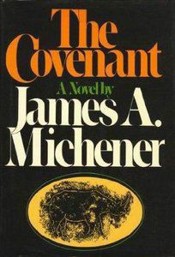The Covenant

There are “epic” novels, and then there’s this. It’s the history of South Africa, starting in 14,000 BC and ending in 1978.
There are 14 chapters, and each chapter handles a different time period. We start about 10,000 years back with cave dwellers wandering the southern part of the continent, looking for food, and plotting to steal wives from each other. Then we progress to the 600s, then the 1400s, then forward, about 50 to 75 years at a time.
We follow three major families: the Nxumalo (African), the Van Doorn (originally Dutch), and the Saltwoods (originally English). There are other people floating in and out, but all the chapters have some connection to someone in those three families.
I was struck by how the story of South Africa parallels the story of America: a small colony started by a European power, other races joining the mix through slavery or lack of better options, a belief in the divine right of their religion, slow expansion until they came into conflict with the natives, and a belief that they (the colonists) bettered the land and the people and therefore hold right to it.
The novel portrays the major conflicts as:
The white man against the natives; both the ones who lived there, and ones imported as slaves
The Dutch against the English; the two powers swapped the country a couple times and fought a couple brutal wars over it
The farmer against the city or “the company”; the Dutch East India Company owned the Cape Colony for many years, until the “Boers” (farmers) got tired of it and struck out on their own
The book ends during apartheid (it was published in 1980). The final chapters describe that system through the lens of a girl who is accused of being “colored” and kicked out of her school, and then through the court trial of a Black protester (one of the Nxumalo family) accused of sedition.
There are many callbacks throughout the book. Characters and families from hundreds of years back will come back to play a role in future events. And later in the book, the racial heritage of one of the families is highlighted and recast.
Racial conflict permeates the entire length. I am an outsider, of course, but the history of South Africa is predominantly one of racial conflict, and how those conflicts heighten and then are ultimate settled (?) in the years after Michener was long-dead.
Book Info
- I have read this book. According to my records, I completed it on .
- A hardcover copy of this book is currently in my home library.